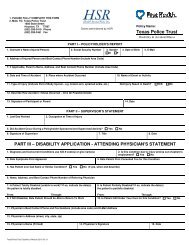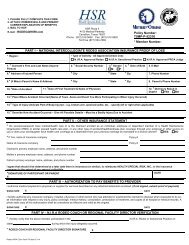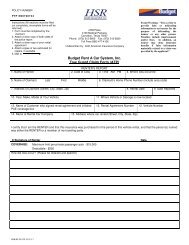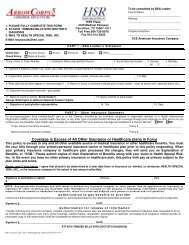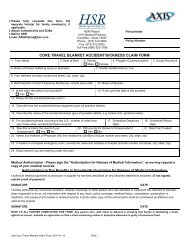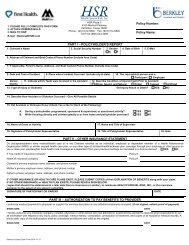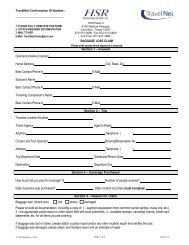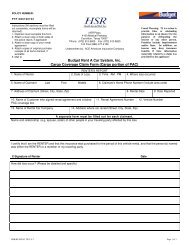SCCA Claim Form - Health Special Risk, Inc.
SCCA Claim Form - Health Special Risk, Inc.
SCCA Claim Form - Health Special Risk, Inc.
Create successful ePaper yourself
Turn your PDF publications into a flip-book with our unique Google optimized e-Paper software.
<strong>SCCA</strong> <strong>Claim</strong> <strong>Form</strong> 13-1-31FRAUD STATEMENTSGeneral: Any person who knowingly and with intent to defraud any insurance company or other person files an application for insurance orstatement of claim containing any materially false information or conceals for the purpose of misleading, information concerning any fact materialthereto, commits a fraudulent insurance act.Alaska: A person who knowingly and with intent to injure, defraud, or deceive an insurance company files a claim containing false, incomplete, ormisleading information may be prosecuted under state law.Arizona: For your protection Arizona law requires the following statement to appear on this form. Any person who knowingly presents a false orfraudulent claim for payment of a loss is subject to criminal and civil penalties.Arkansas, Louisiana, Maryland, West Virginia: Any person who knowingly presents a false or fraudulent claim for payment of a loss or benefit orknowingly presents false information in an application for insurance is guilty of a crime and may be subject to fines and confinement in prison.California: For your protection California law requires the following to appear on this form: Any person who knowingly presents false or fraudulentclaim for the payment of a loss is guilty of a crime and may be subject to fines and confinement in state prison.Colorado: It is unlawful to knowingly provide false, incomplete, or misleading facts or information to an insurance company for the purpose ofdefrauding or attempting to defraud the company. Penalties may include imprisonment, fines, denial of insurance and civil damages. Any insurancecompany or agent of an insurance company who knowingly provides false, incomplete, or misleading facts or information to a policyholder orclaimant for the purpose of defrauding or attempting to defraud the policyholder or claimant with regard to a settlement or award payable frominsurance proceeds shall be reported to the Colorado Division of Insurance within the Department of Regulatory Agencies.Connecticut: This form must be completed in its entirety. Any person who intentionally misrepresents or intentionally fails to disclose any materialfact related to a claimed injury may be guilty of a felony.Delaware, Idaho, Indiana: Any person who knowingly, and with intent to injure, defraud, or deceive any insurer, files a statement of claim containingany false, incomplete or misleading information is guilty of a felony.District of Columbia: Warning: It is a crime to provide false or misleading information to an insurer for the purpose of defrauding the insurer or anyother person. Penalties include imprisonment and/or fines. In addition, an insurer may deny insurance benefits if false information materially relatedto a claim was provided by the applicant.Florida: Any person who knowingly and with intent to injure, defraud or deceive any insurer files a statement of claim or an application containingany false, incomplete or misleading information is guilty of a felony of the third degree.Hawaii: For your protection, Hawaii law requires you to be informed that presenting a fraudulent claim for payment of a loss or benefit is a crimepunishable by fines or imprisonment, or both.Kentucky: Any person who knowingly and with intent to defraud any insurance company or other person files a statement of claim containing anymaterially false information or conceals, for the purpose of misleading, information concerning any fact material thereto commits a fraudulentinsurance act, which is a crime.Maine: It is a crime to knowingly provide false, incomplete or misleading information to an insurance company for the purpose of defrauding thecompany. Penalties may include imprisonment, fines, or a denial of insurance benefits.Michigan, North Dakota, South Dakota: Any person who knowingly and with intent to defraud any insurance company or another person files astatement of claim containing any materially false information, or conceals for the purpose of misleading, information concerning any fact materialthereto, commits a fraudulent insurance act, which is a crime, and subjects the person to criminal and civil penalties.Minnesota; A person who files a claim with intent to defraud or helps commit a fraud against an insurer is guilty of a crime.Nevada: Any person who knowingly files a statement of claim containing any misrepresentation or any false, incomplete or misleading informationmay be guilty of a criminal act punishable under state or federal law, or both, and may be subject to civil penalties.New Hampshire: Any person who, with a purpose to injure, defraud or deceive any insurance company, files a statement of claim containing anyfalse, incomplete or misleading information is subject to prosecution and punishment for insurance fraud as provided in section 638:20.New Jersey: Any person who knowingly files a statement of claim containing any false or misleading information is subject to criminal and civilpenalties.New Mexico: Any person who knowingly presents a false or fraudulent claim for payment of a loss or benefit or knowingly presents falseinformation in an application for insurance is guilty of a crime and may be subject to civil fines and criminal penalties.New York: Any person who knowingly and with intent to defraud any insurance company or other person files an application for insurance orstatement of claim containing any materially false information, or conceals for the purpose of misleading, information concerning any fact materialthereto, commits a fraudulent insurance act, which is a crime , and shall also be subject to a civil penalty not to exceed five thousand dollars and thestated value of the claim foe each such violation.Ohio: Any person who, with intent to defraud or knowing that he is facilitating a fraud against an insurer, submits an application or files a claimcontaining a false or deceptive statement is guilty of insurance fraud.Oklahoma: WARNING: Any person who knowingly, and with intent to injure, defraud or deceive any insurer, makes any claim for the proceeds ofan insurance policy containing any false, incomplete or misleading information is guilty of a felony.Oregon: Any person who makes an intentional misstatement that is material to the risk may be found guilty of insurance fraud by a court of law.Pennsylvania: Any person who knowingly and with intent to defraud any insurance company or other person files an application for insurance orstatement of claim containing any materially false information or conceals for the purpose of misleading, information concerning any fact materialthereto commits a fraudulent insurance act, which is a crime and subjects such person to criminal and civil penalties.Tennessee, Virginia, Washington: It is a crime to knowingly provide false, incomplete or misleading information to an insurance company for thepurposes of defrauding the company. Penalties include imprisonment, fines and denial of insurance benefits.Texas: Any person who knowingly presents a false or fraudulent claim for the payment of a loss is guilty of a crime and may be subject to fines andconfinement in state prison.




